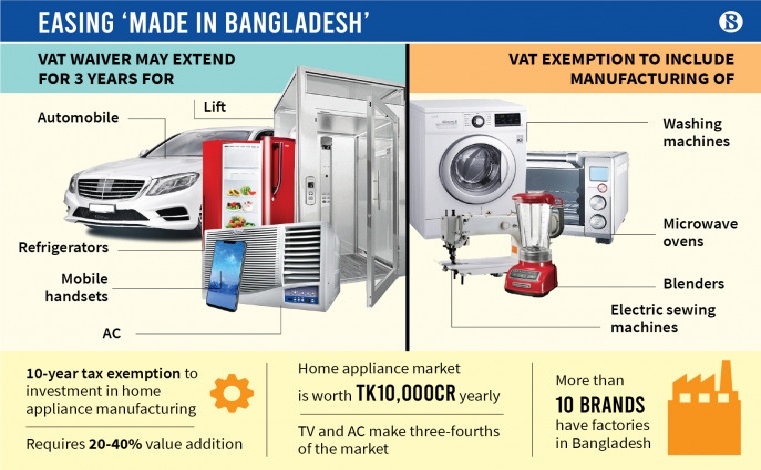In doing so, the National Board of Revenue (NBR) plans to keep the local production of goods substituting foreign items outside the purview of tax and VAT in the next fiscal year.
Sources at the NBR said the finance minister would announce the tax and VAT waiver for "Made-in-Bangladesh" goods in the budget session in parliament on 3 June.
VAT exemption may be extended in the upcoming budget for electronic goods, including mobile set, refrigerator, AC, fridge and TV and automobile industry. At the same time, the manufacturing of home appliances, including washing machine, electric sewing machine, microwave oven and blender is likely to get VAT exemption for the first time for fiscal year 2021-22.
The budget may also announce a 10-year tax holiday for new factories rolling out production.
To enjoy the benefit, companies have to add value to their products from 20-30%. Factories will also have to be set up outside Dhaka and Chattogram cities. But if the manufacturing units are in the cities, companies will enjoy the tax waiver for 5 years.
Despite the conditions, the tax holiday will play a big role in helping the industry flourish, businessmen said.
An NBR official, who is closely associated with budget formulation, told The Business Standard that the government had been nurturing the "Made-in-Bangladesh" concept for years, aimed at boosting local industries and employment. As part of the plan, different sectors were given tax holiday and exempted from VAT and tax over the last one decade.
Nothing is, however, final until the budget is placed in parliament, the official said.
An AC of one ton of General brand cost Tk80,000 in 2012, and more than eight years later an AC of the same capacity made by local brands, such as Walton and Vision, costs Tk35,000-40,000.
VAT and tax exemption inspired local entrepreneurs to start manufacturing electronic items, bringing down the prices by half. That multiplied the number of consumers.
Apart from AC, the affordability of motorcycles, TV, mobile phones and refrigerators has also gone up, making lives easier than before.
Entrepreneurs said the sector had witnessed a massive growth after the introduction of VAT and tax waiver for electronic goods in 2010. It has generated direct and indirect employment of more than 5 lakh people, alongside reducing the prices of the commodities.
Over time, locally manufactured goods have taken up 90% of the total market. Apart from local brands, foreign brands, such as Samsung, LG and Butterfly, have set up factories in the country.
MA Razzak Khan, vice-president of the Federation of Bangladesh Chambers of Commerce and Industry and chairman of local brand Minister, said the new benefits would even enable local brands to export products to different parts of the world.
He also suggested increasing tax on imports.
Golam Murshed, managing director of Walton, said Bangladesh has become solely dependent on the RMG sector and "it is necessary to come out of this dependency".
"The electric and electronics sector will emerge as an alternative because of this facility," Murshed said.
"If the facility continues, this sector could grow four to five times," he added.
Mohammed Mesbah Uddin, chief marketing officer of Fair Group that produces electronic commodities of Korean giant Samsung in Bangladesh, said the demand for home appliances and electronic items had gone up as the electricity coverage expanded and living standards improved.
The new benefits, if given, will boost the production further, making a greater contribution to the GDP.














